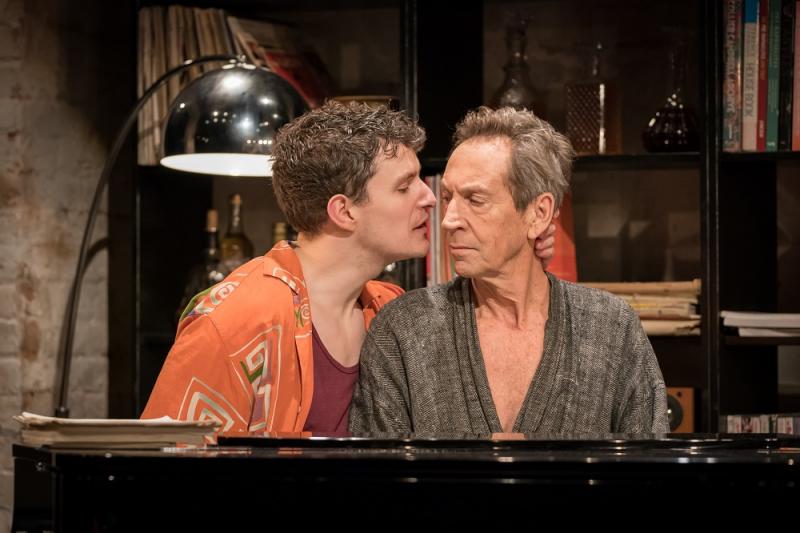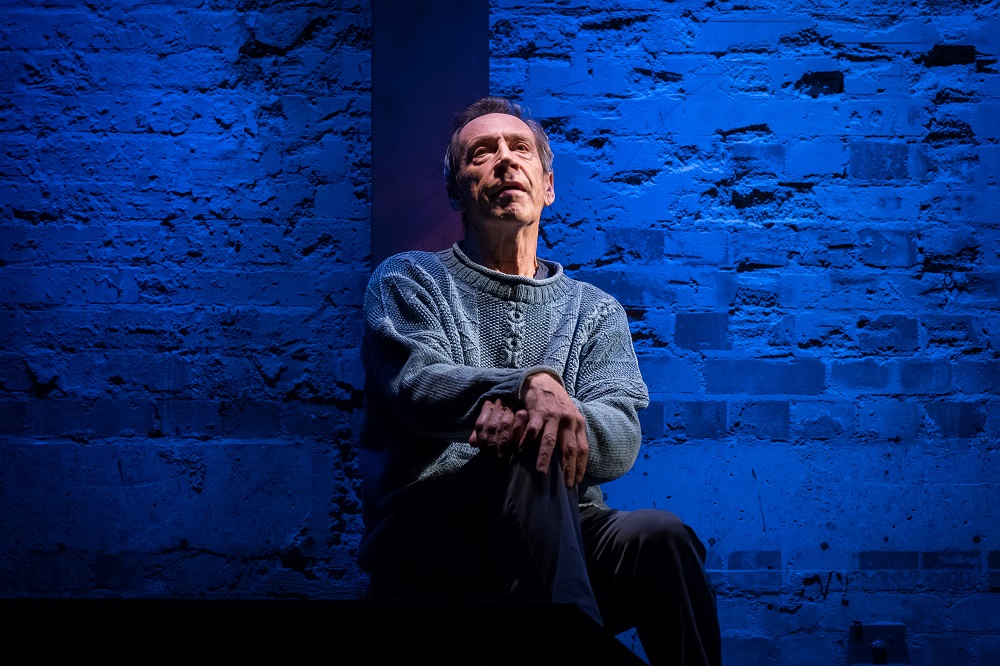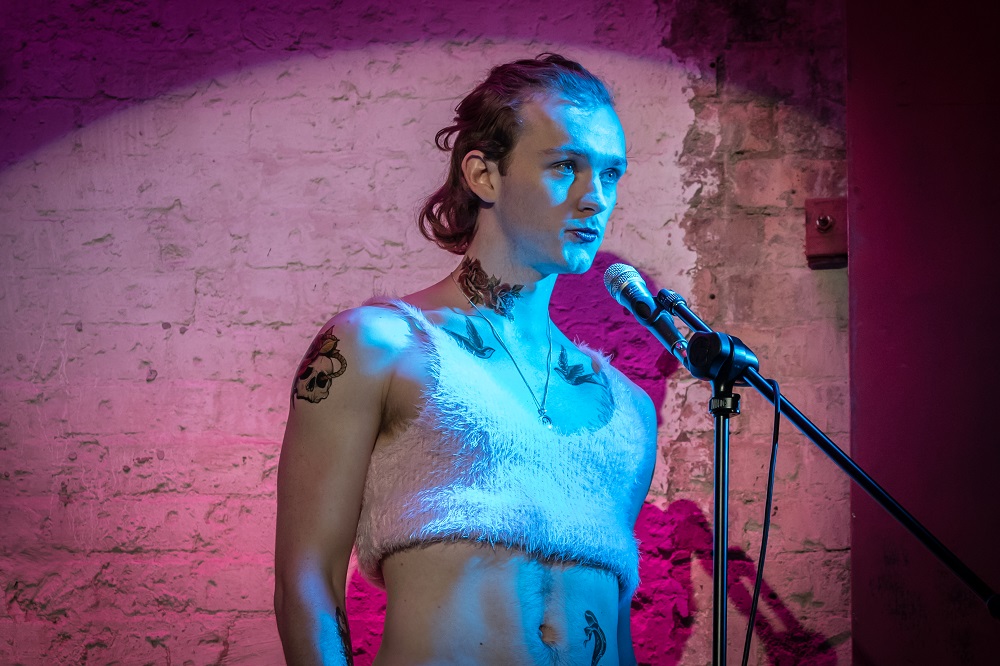Gently Down the Stream, Park Theatre review - gay history sifted for compact drama | reviews, news & interviews
Gently Down the Stream, Park Theatre review - gay history sifted for compact drama
Gently Down the Stream, Park Theatre review - gay history sifted for compact drama
Martin Sherman has the excellent Jonathan Hyde telling true tales

Ripeness is sometimes all.
Sherman is, of course, like Kramer, part of that history he wants to perpetuate. As he points out in a programme interview, "if, for instance, you are a young African American man, it isn't possible to forget the past... If you are Jewish, there are countless books and films as well as oral histories recounting the Holocaust. But gay history has, until recently, been somewhat lost in a fog. It's important to keep telling stories." Here the stories are eagerly sought by Rufus (Ben Allen), a febrile 28-year-old city worker, from the new lover with whom he starts to make a life, 62-year-old Beau (Jonathan Hyde), a cocktail bar pianist from New Orleans with all the "scar tissue" of his generation. The past emerges partly in dialogue, partly in Beau's three reluctant monologues recorded by Rufus (Hyde pictured below).  It's a simple but effective structure. The life of Beau and Rufus, complicated eventually by the arrival of performance artist Harry (Harry Lawtey), the young(er) lover Beau has advised Rufus to take, itself becomes part of the gay chronicle: a civil partnership proposed but not accepted; a wedding which allows the last of Beau's big monologues to unfold as what turns out to be a best man's speech; domesticity with a child for which Rufus seems unprepared. Meanwhile Beau's reminiscences zigzag through time, the confidences he's received in turn taking us back as far as the 1920s. Heard of Mabel Mercer? Me, neither. She's the Midlands-born, mixed-race chanteuse whom Sherman gives Beau as accompanist for her later years. What we hear of her recordings is stunning. "She mythologised our misery," says Beau when Rufus suggests a glamour to the secrecy of gay life in the older man's younger days. Rufus has a bipolar condition – so Alaskan-sounding, says Beau, who eventually forces on him a need to medicate his manic depression; back then, alcoholism was the name of the game.
It's a simple but effective structure. The life of Beau and Rufus, complicated eventually by the arrival of performance artist Harry (Harry Lawtey), the young(er) lover Beau has advised Rufus to take, itself becomes part of the gay chronicle: a civil partnership proposed but not accepted; a wedding which allows the last of Beau's big monologues to unfold as what turns out to be a best man's speech; domesticity with a child for which Rufus seems unprepared. Meanwhile Beau's reminiscences zigzag through time, the confidences he's received in turn taking us back as far as the 1920s. Heard of Mabel Mercer? Me, neither. She's the Midlands-born, mixed-race chanteuse whom Sherman gives Beau as accompanist for her later years. What we hear of her recordings is stunning. "She mythologised our misery," says Beau when Rufus suggests a glamour to the secrecy of gay life in the older man's younger days. Rufus has a bipolar condition – so Alaskan-sounding, says Beau, who eventually forces on him a need to medicate his manic depression; back then, alcoholism was the name of the game.
Hyde's delivery of the monologues is mesmerising and deeply moving (to tears, surely, when Beau talks poetically of Judith Peabody, the socialite who cared for so many dying young men in 1980s New York). I can't vouch for the authenticity of the New Orleans accent tinged with Brooklyn, but the careful balance of irony, caustic wit and deep emotion is always finely held. An act of violence against a gay gathering in a bar is the final chapter, albeit not chronologically, in Beau's narrative. Meanwhile we see his in-the-moment pain of dealing with a younger lover he ought to trust but can't, entirely, his outward acceptance of a change in circumstances and inner grief.  There's a genuinely magical moment when Harry swaps pulling mobile phones out of his arse – as we're told about his performance art – in favour of cabaret singing and a superb interpretation by Lawtey of "The Man I Love" (pictured above), tellingly taking from storytelling Beau the upper stage against the bare back wall so well lit by Jamie Platt (Lee Newby's ground-level recreation of Beau's living room is convincingly real). Allen makes us like and trust Rufus from the start, so that we go with his slightly scary manic moments and a short scene which is enough to delineate the plunge into a deep depression, handled by Beau with patient sensitivity.
There's a genuinely magical moment when Harry swaps pulling mobile phones out of his arse – as we're told about his performance art – in favour of cabaret singing and a superb interpretation by Lawtey of "The Man I Love" (pictured above), tellingly taking from storytelling Beau the upper stage against the bare back wall so well lit by Jamie Platt (Lee Newby's ground-level recreation of Beau's living room is convincingly real). Allen makes us like and trust Rufus from the start, so that we go with his slightly scary manic moments and a short scene which is enough to delineate the plunge into a deep depression, handled by Beau with patient sensitivity.
Above all these are people we can really care about without resort to cosy sentimentality, which has not been a given in many recent gay plays. Sherman's – which is in any case a love story that should resonate with everyone – ought to be a winner. The buzz of a first-night audience including many figures who are also part of Sherman's history wasn't just a luvvie-fest; this is a deeply felt gem which deserves a West End transfer.
The future of Arts Journalism
You can stop theartsdesk.com closing!
We urgently need financing to survive. Our fundraising drive has thus far raised £49,000 but we need to reach £100,000 or we will be forced to close. Please contribute here: https://gofund.me/c3f6033d
And if you can forward this information to anyone who might assist, we’d be grateful.

Subscribe to theartsdesk.com
Thank you for continuing to read our work on theartsdesk.com. For unlimited access to every article in its entirety, including our archive of more than 15,000 pieces, we're asking for £5 per month or £40 per year. We feel it's a very good deal, and hope you do too.
To take a subscription now simply click here.
And if you're looking for that extra gift for a friend or family member, why not treat them to a theartsdesk.com gift subscription?
more Theatre
 The Line of Beauty, Almeida Theatre review - the 80s revisited in theatrically ravishing form
Alan Hollinghurst novel is cunningly filleted, very finely acted
The Line of Beauty, Almeida Theatre review - the 80s revisited in theatrically ravishing form
Alan Hollinghurst novel is cunningly filleted, very finely acted
 Wendy & Peter Pan, Barbican Theatre review - mixed bag of panto and comic play, turned up to 11
The RSC adaptation is aimed at children, though all will thrill to its spectacle
Wendy & Peter Pan, Barbican Theatre review - mixed bag of panto and comic play, turned up to 11
The RSC adaptation is aimed at children, though all will thrill to its spectacle
 Hedda, Orange Tree Theatre review - a monument reimagined, perhaps even improved
Scandinavian masterpiece transplanted into a London reeling from the ravages of war
Hedda, Orange Tree Theatre review - a monument reimagined, perhaps even improved
Scandinavian masterpiece transplanted into a London reeling from the ravages of war
 The Assembled Parties, Hampstead review - a rarity, a well-made play delivered straight
Witty but poignant tribute to the strength of family ties as all around disintegrates
The Assembled Parties, Hampstead review - a rarity, a well-made play delivered straight
Witty but poignant tribute to the strength of family ties as all around disintegrates
 Mary Page Marlowe, Old Vic review - a starry portrait of a splintered life
Tracy Letts's Off Broadway play makes a shimmeringly powerful London debut
Mary Page Marlowe, Old Vic review - a starry portrait of a splintered life
Tracy Letts's Off Broadway play makes a shimmeringly powerful London debut
 Little Brother, Soho Theatre review - light, bright but emotionally true
This Verity Bargate Award-winning dramedy is entertaining as well as thought provoking
Little Brother, Soho Theatre review - light, bright but emotionally true
This Verity Bargate Award-winning dramedy is entertaining as well as thought provoking
 The Unbelievers, Royal Court Theatre - grimly compelling, powerfully performed
Nick Payne's new play is amongst his best
The Unbelievers, Royal Court Theatre - grimly compelling, powerfully performed
Nick Payne's new play is amongst his best
 The Maids, Donmar Warehouse review - vibrant cast lost in a spectacular-looking fever dream
Kip Williams revises Genet, with little gained in the update except eye-popping visuals
The Maids, Donmar Warehouse review - vibrant cast lost in a spectacular-looking fever dream
Kip Williams revises Genet, with little gained in the update except eye-popping visuals
 Ragdoll, Jermyn Street Theatre review - compelling and emotionally truthful
Katherine Moar returns with a Patty Hearst-inspired follow up to her debut hit 'Farm Hall'
Ragdoll, Jermyn Street Theatre review - compelling and emotionally truthful
Katherine Moar returns with a Patty Hearst-inspired follow up to her debut hit 'Farm Hall'
 Troilus and Cressida, Globe Theatre review - a 'problem play' with added problems
Raucous and carnivalesque, but also ugly and incomprehensible
Troilus and Cressida, Globe Theatre review - a 'problem play' with added problems
Raucous and carnivalesque, but also ugly and incomprehensible
 Clarkston, Trafalgar Theatre review - two lads on a road to nowhere
Netflix star, Joe Locke, is the selling point of a production that needs one
Clarkston, Trafalgar Theatre review - two lads on a road to nowhere
Netflix star, Joe Locke, is the selling point of a production that needs one
 Ghost Stories, Peacock Theatre review - spirited staging but short on scares
Impressive spectacle saves an ageing show in an unsuitable venue
Ghost Stories, Peacock Theatre review - spirited staging but short on scares
Impressive spectacle saves an ageing show in an unsuitable venue

Add comment